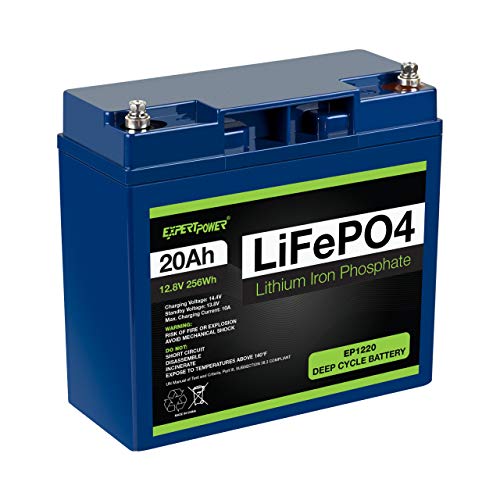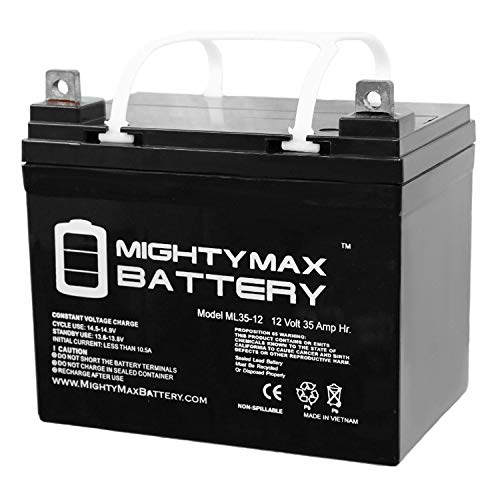Looking for a trolling motor battery that will fit in your kayak? You’ve come to the right place!
Having a trolling motor for your kayak saves you from having to paddle hour after hour. In turn, you get to conserve your arm strength for the things that matter, such as casting and reeling in your next great catch.
The problem is, not every battery will work for a kayak trolling motor. Just like some trolling motors are made specifically for kayaks, it takes a specially-made battery to power those trolling motors.
So what should you look for when choosing a trolling motor battery for your kayak? And what are some of the best kayak trolling motor batteries on the market?
Glad you asked!
Keep reading for a buying guide and reviews of our top picks for trolling motor batteries for kayaks.
Table of Contents
Kayak Trolling Motor Battery Buying Guide
Obviously, kayaks are small boats. Even those specifically made for fishing, which often have extra storage space, simply don’t have the room or the capacity for tons of extra weight.
In addition, the nature and use of kayaks often subject them to greater amounts of spray as well as vibrations and movements in the water.
For all of these reasons, if you have a trolling motor on your kayak, you need a special type of battery to power it.
Let’s take a closer look at the type, size, weight, and durability factors that make for the best kayak trolling motor batteries.
Type
There are different types of batteries. Those most often used for boats and trolling motors are marine deep cycle batteries, but even these come in various kinds and styles.
In this article, you will see four different types of deep cycle batteries: lead acid, AGM, gel, and lithium. Of all of these battery types, lithium is perhaps the most desirable for kayaks.
Why?
In short, they are lightweight, take up less space, and last longer than other types of batteries. But we’ll talk more about that as we go through this article.
Size

Since kayaks have limited space, you’ll need a battery that doesn’t take up a whole lot of room. You may need a battery that is shorter than most, or that can be laid on its side without causing damage to the battery or to your kayak.
Most trolling motor batteries are too large to use efficiently with a kayak, but all of the batteries reviewed in this article are small enough to fit in tight spots without compromising the performance of your trolling motor.
Weight

Similar to size, a battery’s weight is also an important factor when choosing one that will fit your kayak.
Many times, your kayak will already be loaded down with fishing or camping gear. You don’t want to load down too much or you may exceed the weight limit, which depending on the kayak may be as little as 200-300 pounds.
Even if your kayak can hold a greater amount of weight, it’s nice to have a lightweight battery so that you can carry the maximum amount of gear (and, in some cases, passengers) with you.
Durability
Kayaks are often used in rivers and choppier waters. They also sit rather low in the water, often just a few inches above the waterline.
For these reasons, it’s important to have both a trolling motor and a battery that can handle humidity, rain, and spray. Most marine batteries are able to take a beating, but some are more water resistant than others.
All of the batteries reviewed in this article are rated for marine uses and have been used successfully when paired with a trolling motor in a kayak.
Top 3 Picks for You
Last update on 2026-02-23 at 17:08 / Affiliate links / Images from Amazon Product Advertising API
Kayak Trolling Motor Battery Reviews
1. Best Lead Acid: Mighty Max Deep Cycle Sealed Battery
This lead acid battery by Mighty Max is a solid, inexpensive battery choice for your kayak. It is versatile, waterproof, and comes in a smaller package than many lead acid batteries.
This is a 12-volt, 35 amp hour battery, and the dimensions are roughly 7.5 x 5 x 7 inches. It is extremely lightweight compared to other lead acid batteries.
Though it isn’t the smallest battery on this list, it has the capability to be mounted in several different positions, so you can easily lay the battery on the kayak’s side without having to worry about damage.
The battery is also resistant to shocks and vibrations, and it is rated for a number of different uses, both marine and non-marine. It is built to last, made of high-quality materials and designed to handle a fair amount of use and abuse.
This battery is perfect for anyone looking for an inexpensive, versatile battery that they can depend on for at least two or three years, depending how much it is used and how well it’s taken care of between uses.
Some of the battery’s features include a deep discharge recovery, meaning you can run it relatively low without causing damage; a sealed design which prevents it from breaking and leaking; and a wide temperature range so you can use it in a range of conditions.
The battery also comes with a 1-year warranty.
It does not include mounting accessories or a wire harness, so you will need to purchase these separately. Also, the battery won’t last as long per charge as some other types of battery.
What We Like:
- The battery can be mounted in multiple positions.
- The battery is inexpensive yet provides good value.
- The battery is not easily damaged by vibrations or temperature fluctuations.
What We Don’t Like:
- This battery has a relatively short charge life.
2. Best AGM: VMAX Deep Cycle Battery
This AGM battery from VMAX is similar in size and appearance to the Mighty Max battery above, but its well-designed AGM construction gives it a generally longer running time.
In fact, the company claims this battery has an average run time of 4-9 hours per charge, depending on the size of your trolling motor and the water conditions. The battery is designed so that there’s no risk of leakage, so it can be mounted on the battery’s side if necessary.
The 12-volt, 35-amp-hour battery is not easily damaged by movements and vibrations, so it’s a great choice for a kayak. It is maintenance-free, long lasting, and recovers well even after long, deep discharges. The battery size is roughly 7.5 x 6 x 5 inches and weighs 25 pounds.
This battery is a good choice for any kayaker who’s willing to pay a bit more for a battery that will last longer, but who wants to stick with dependable AGM technology.
This battery’s key features include a fast recharge rate to help you get back on the water quickly and a lead tin alloy construction for durability.
It is worth noting, however, that this battery doesn’t last as long on a single charge as other comparable batteries. Some users have reported that it only lasts a couple of hours when powering a trolling motor.
What We Like:
- This battery has a long charge life.
- The battery has a deep discharge capacity and recharges quickly.
- It is relatively lightweight for an AGM battery.
What We Don’t Like:
- Battery charge life could be better.
3. Best Lithium: ExpertPower Deep Cycle Lithium Iron Phosphate Battery
This lithium battery produced by ExpertPower is one of the very best when choosing a battery for your kayak. It combines several fantastic features and benefits over other types of batteries, all of which make it an excellent choice.
Firstly, this battery is relatively small and lightweight. It’s 12-volt and comes in various amp-hour options, from 10 to 200. The largest size you may need for a canoe is a 50Ah, though you could probably get away with a 20Ah. The 20Ah weighs under 6 pounds and is 7 x 3 x 6.5 inches.
This is a true deep cycle battery in that it still puts out 12 volts of power even when 95% discharged. What does this mean for you? It means this battery lasts significantly longer between charges, so you don’t have to worry about your battery dying when you’re on the water.
In addition, this battery is good for anywhere between 2,500 and 7,000 charge-discharge cycles, meaning it will last much longer than other batteries. With a lifetime warranty, the battery may even outlast your trolling motor.
This is a great battery for anyone who’s willing to give lithium a try and who doesn’t mind paying extra for the best of the best.
Key features include a battery management system, which is built in and protects the battery from damage; a low self-discharge rate so you can store the battery up to one year without harming the battery; and a wide temperature range so you can use it in every season.
Some users have found the battery to be a bit delicate, so make sure it is mounted securely in your kayak before hitting the water.
What We Like:
- This battery lasts a long time between charges.
- This battery is guaranteed with a lifetime warranty.
- This battery is exceptionally lightweight.
What We Don’t Like:
- The battery can be a bit fragile.
4. Best Gel: Mighty Max Deep Cycle Battery
This gel battery by Mighty Max is similar to the lead acid reviewed above, with a few notable improvements.
The battery is gel-based, which gives it a longer lifespan than comparable lead acid and AGM batteries. Not only do they hold a charge longer, but they generally last for more years.
This battery is a 12V, 35Ah with the same dimensions as the lead acid above. The gel inside the battery gives it better shock absorbency than both lead acid and AGM batteries, and this particular gel battery is fully sealed to eliminate the risk of leaks and spills.
It is a great battery choice for anyone who wants a long-lasting, safe battery at an excellent and affordable price.
The battery’s features include multiple pack options so you can buy one, two, or four at a time; a reasonably low weight of 23 pounds; and multiple mounting positions so you can lay it on the kayak’s side.
The main drawback of this battery is that it takes a very long time to charge, particularly when it has been significantly discharged.
What We Like:
- The battery has a relatively long life for an inexpensive price tag.
- The battery is fairly lightweight.
- The battery can be mounted in various positions.
What We Don’t Like:
- The battery takes a long time to charge.
5. Best Budget Option: ECO-WORTHY Deep Cycle Lithium Iron Phosphate Battery
This lithium battery by ECO-WORTHY is extremely similar to the ExpertPower reviewed above, but it comes in a 30Ah size.
The company claims this battery lasts for 3,000 charge-discharge cycles, then continues to operate at 80% beyond 3,000 cycles. The 30Ah battery weighs just over 6 pounds, and the dimensions are roughly 7 x 6 x 3 inches.
Like the ExpertPower battery, this battery can discharge up to 95% while still running at maximum power, so it will last you a long time on the water.
This battery is ideal for those who believe in, or who want to experience, all the benefits of lithium.
The battery’s key features include a wide temperature range and a built-in battery management system which helps the battery protect itself from damage.
Some customers claim that the battery capacity is lower than advertised, which may affect its overall performance.
What We Like:
- The battery comes in several amp-hour options.
- The battery is lightweight.
- The battery management system is a great feature to have.
What We Don’t Like:
- The battery may have a lower than advertised capacity.
Last update on 2026-02-23 at 17:08 / Affiliate links / Images from Amazon Product Advertising API
Conclusion
Our top pick for the best trolling motor battery for kayaks is the ExpertPower Lithium battery. This is because the battery provides the greatest value for the best price, it comes with a lifetime warranty, and the company has demonstrated excellent customer service.
That said, whether you’re looking for lithium, AGM, gel, or lead acid batteries for your kayak trolling motor, the ones reviewed in this article are some of the best on the market.

Sarah Hood has been writing for Anchor Travel since 2021. When she’s not writing, she enjoys cooking, singing, and spending time in the great outdoors.










Burton
Wednesday 26th of January 2022
Is there a special voltage regulator available to protect your alternator in the instance of charging with your vehicle?
Steve
Wednesday 1st of June 2022
You do not need to use a special kind of voltage regulator for charging your marine battery with your vehicle; any regulator will do.
It’s important to remember that the marine battery must be a 12V battery. For example, if you try to charge a 6V marine battery with your 12V car battery, a voltage regulator won’t help you; you will sustain damage to both batteries.